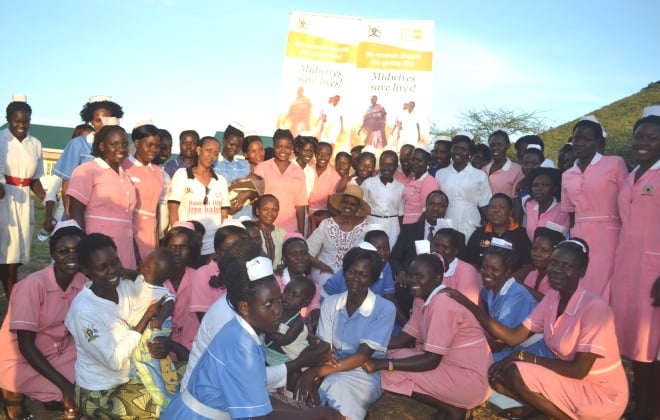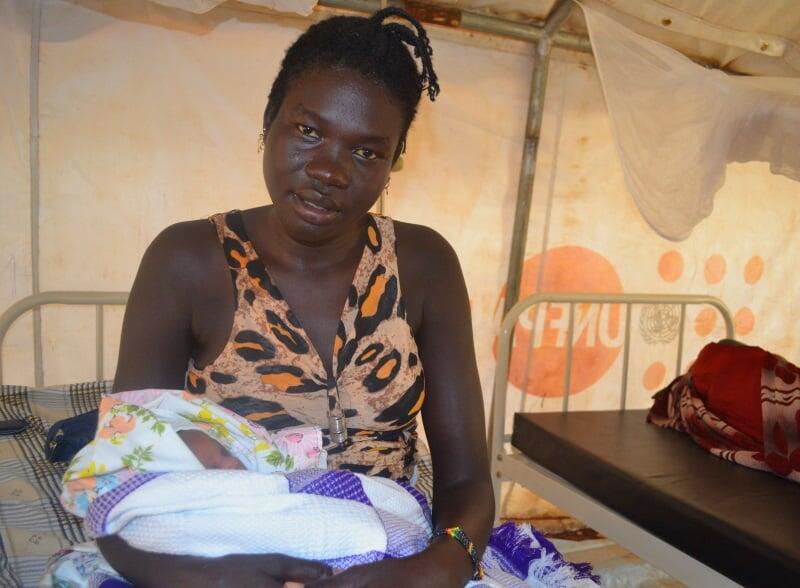NAPAK, Karamoja region, Uganda – In an attempt to plug the gap in midwives in Uganda to reduce maternal deaths and injuries, 90 new midwives trained with UNFPA’s support have been commissioned to work in hard-to-reach, under-served regions.
The commissioning ensures the midwives are deployed so that they put their skills to immediate use and don’t need to sit and wait for jobs, said UNFPA Country Representative Esperance Fundira.
At an event attended by 180 UNFPA-supported midwives and hosted by the First Lady of Uganda, Janet Kataaha Museveni, at the State House in the north eastern district of Napak, on 23 April, the midwives shared their stories of resilience and described what inspired them to join the profession.
Their touching testimonies were acknowledged by the First Lady, who is also the champion of safe motherhood in Uganda. She applauded them for their courage and strength, and for choosing to pursue midwifery on completion of their studies to enhance maternal health. She urged them to serve their nation diligently.
A mother’s death during pregnancy and childbirth is not only a health issue. It is also a social calamity. - First Lady of Uganda, Janet Kataaha Museveni
‘Maternal deaths declining with UNFPA support’
Because of UNFPA’s support, maternal mortality in the region has declined, the First Lady said. “There were many gaps in Karamoja before UNFPA’s input of training more midwives. The more midwives we get in our health centres, the more this problem will decrease,” she said.

However, while this reduction is worth celebrating, maternal deaths remain unacceptably high and efforts need to be intensified to accelerate progress to reach the SDG targets.
“A mother’s death during pregnancy and childbirth is not only a health issue. It is also a social calamity,” the First Lady said. “Maternal deaths also hinder efforts to fight poverty and accelerate our community’s progress towards reaching Uganda’s vision to attain middle-income status by 2020.”
She urged the midwives to play a central role in eliminating maternal deaths by creating awareness by sharing life-saving information. Fathers, who play a pivotal role in the reproductive health of their families, must be included.
“We need to bring the fathers on board so that they can play their role. We need to facilitate mothers reaching health facilities and getting the needed care in a timely manner. We need to support mothers and their families during pregnancy and childbirth,” the First Lady said.
State of midwifery services in Uganda
Uganda has a high maternal death rate. Around 7000 women die each year – as many as 20 mothers every day – due to pregnancy and birth-related complications.
Access to skilled birth attendance reduces the risk of maternal death and other child-birth related complications by up to 87 per cent, according to the State of the World’s Midwifery Report (2014).
In Uganda, access to this essential care is constrained by a human resources gap in midwifery. Only 57 per cent of pregnant women receive skilled attendance at birth, according to the Uganda Demographic and Health Survey (2011).
Although the World Health Organization (WHO) recommends that a midwife should support not more than 175 deliveries a year, in Uganda it is estimated that a midwife supports between 350 and 500 deliveries a year. The country therefore needs 3000 more midwives to meet the required minimum staffing norms.
The Government of Uganda acknowledges the challenge: “The 7000 plus deaths that occur during pregnancy and childbirth every year in Uganda can be prevented with proper midwifery care. We cannot sit back and watch as our mothers die during preventable causes,” said Minister of Health Elioda Tumwesigye.
The government is committed to ensuring that the quality of health services is improved and midwifery services are available. “My Ministry is also determined to ensure that skilled attendance at birth is increased and maternal mortality is reduced significantly,” he said.
We are taking another big step to ensure that Uganda bridges the human resource gap for midwifery services. - UNFPA Country Representative, Esperance Fundira.
UNFPA supports midwifery training
Since 2010, UNFPA with financial support from Sweden has established a bursary fund for midwifery training for underserved regions in Karamoja. The bursary beneficiaries are bonded and must work in the districts that seconded them for at least two years after training. To date, a total of 462 midwives have been trained, of which 79 per cent have qualified and been deployed.
This year, UNFPA has committed to supporting the government to bring on board 130 midwives to work in the underserved districts in Uganda. The 90 already commissioned have reported to their duty stations and will be supported by UNFPA on a contract for 1 to 2 years before the government takes them on.
“We are taking another big step to ensure that Uganda bridges the human resource gap for midwifery services,” said UNFPA Country Representative Esperance Fundira.
Midwives are key critical cadres in ensuring delivery on the promise of the Sustainable Development Goals, she said. Moreover, no woman should have to risk her life or that of her unborn baby by giving birth without expert care.
“Midwives, you are our heroes and the backbone of Sexual and Reproductive Health services in Uganda. We shall continue supporting you so that Uganda can be a better place for all of us,” Ms. Fundira said.
The First Lady reiterated the government’s commitment to supporting midwives: “Let’s all embrace the slogan ‘zero tolerance to maternal mortality’ and do our utmost best to prevent maternal and newborn deaths,” she said.
By Evelyn Kiapi



